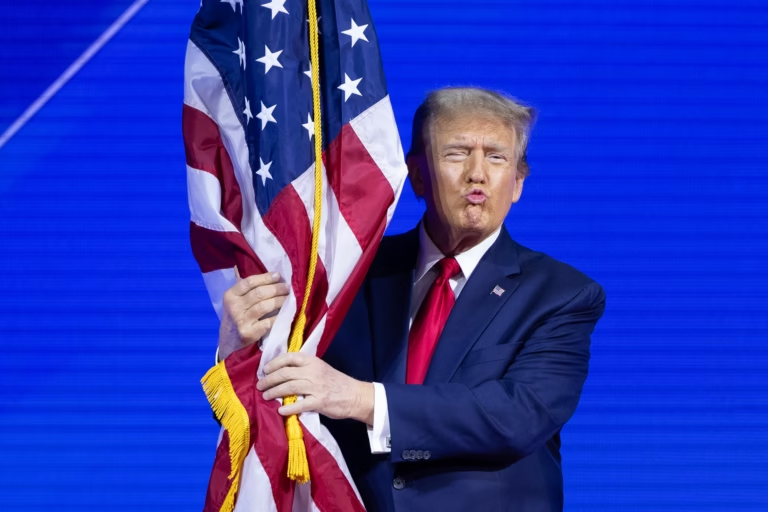In a historic move on February 27, 2025, the Mexican government transferred 29 high-profile cartel leaders to the United States after Trump’s warnings, signaling a significant shift in U.S.-Mexico relations and the ongoing battle against organized crime. Among those extradited was Rafael Caro Quintero, the notorious drug lord implicated in the 1985 murder of DEA agent Enrique “Kiki” Camarena. This unprecedented action reflects the escalating pressure from the Trump administration on Mexico to address the pervasive influence of drug cartels.

U.S. President Donald Trump and Mexican President Enrique Peña Nieto during the G-20 Summit in Hamburg, Germany, on July 7, 2017. (Saul Loeb/AFP/Getty Images)
A Long-Awaited Justice
Rafael Caro Quintero’s extradition stands out due to his infamous past. Accused of orchestrating the brutal killing of DEA agent Camarena four decades ago, his transfer to U.S. custody symbolizes a long-delayed justice. Upon arrival, Caro Quintero was notably shackled with Camarena’s own handcuffs, underscoring the profound significance of this moment for U.S. law enforcement.
From Hesitation to Cooperation
Historically, Mexico has been reticent to extradite its nationals, often citing sovereignty concerns. In 2021, under President Andrés Manuel López Obrador (AMLO), Mexico recorded its lowest level of extraditions to the U.S. in 15 years. This reluctance was attributed to alleged ties between AMLO’s Morena party and major cartels, particularly the Sinaloa Cartel, leading to strained cooperation between the two nations.
Trump’s Unyielding Stance
The inauguration of President Donald Trump marked a pivotal change in U.S. foreign policy toward Mexico. Recognizing the entrenched corruption and cartel influence within the Mexican government, Trump adopted a hardline approach. He threatened comprehensive tariffs on Mexican goods and hinted at unilateral military action should Mexico fail to address the cartel crisis. These assertive measures underscored a departure from previous diplomatic strategies, emphasizing accountability and decisive action.

Economic Leverage and Military Implications
The mere prospect of tariffs sent shockwaves through Mexico’s economy, which is heavily reliant on U.S. trade. Despite discussions about pivoting to China, the immediate economic ramifications of strained U.S. relations were undeniable. Furthermore, explicit warnings from U.S. defense officials about potential military interventions highlighted the seriousness of the administration’s resolve. Such unprecedented threats left Mexican officials both astonished and indignant, challenging long-held narratives of sovereignty and national pride.
A Calculated Response from Mexico
Facing mounting pressure, Mexican President Claudia Sheinbaum’s administration took decisive action. The mass extradition of cartel leaders was not merely a gesture of goodwill but a strategic move to preserve the nation’s political and economic stability. By cooperating, the Mexican government aimed to avert the looming threats of tariffs and potential U.S. military involvement. This cooperation also led to a temporary crackdown on cartel operations and a reduction in illegal border crossings, though skepticism remains about the longevity of these measures.

A soldier stands guard as over 850 kilos of drugs are burned in Monterrey, Mexico. Julio Cesar Aguilar/AFP/Getty Images
The Cartels’ Calculated Gambit
Within the cartel hierarchy, these developments prompted strategic recalibrations. Leaders like Ismael “El Mayo” Zambada, now in U.S. custody, have threatened to expose deep-seated corruption within the Mexican government if their demands are not met. Such revelations could destabilize the political landscape, indicating the cartels’ leverage extends beyond mere violence, deeply intertwining with political structures.
A New Paradigm in U.S.-Mexico Relations
The Trump administration’s approach signifies a transformative period in U.S.-Mexico relations. By linking economic policies directly to security concerns, the U.S. has redefined the parameters of bilateral cooperation. This strategy challenges Mexico to uphold its sovereignty by effectively combating internal corruption and criminal enterprises. The message is unequivocal: respect for sovereignty is reciprocal and contingent upon each nation’s commitment to shared security and legal standards.
The Road Ahead
While the recent extraditions mark a significant victory in the fight against organized crime, the sustainability of these efforts remains uncertain. The deep-rooted nature of cartel influence in Mexico poses ongoing challenges. Continuous vigilance, robust legal frameworks, and unwavering political will are essential to ensure lasting change. The U.S. has demonstrated its readiness to confront these issues head-on, but enduring success will require persistent collaboration and integrity from both nations.
In conclusion, the recent extraditions are a testament to the efficacy of strategic pressure in international relations. They highlight the complex interplay between diplomacy, economic leverage, and security concerns. As both nations navigate this evolving landscape, the pursuit of justice and the reinforcement of mutual respect remain paramount.

